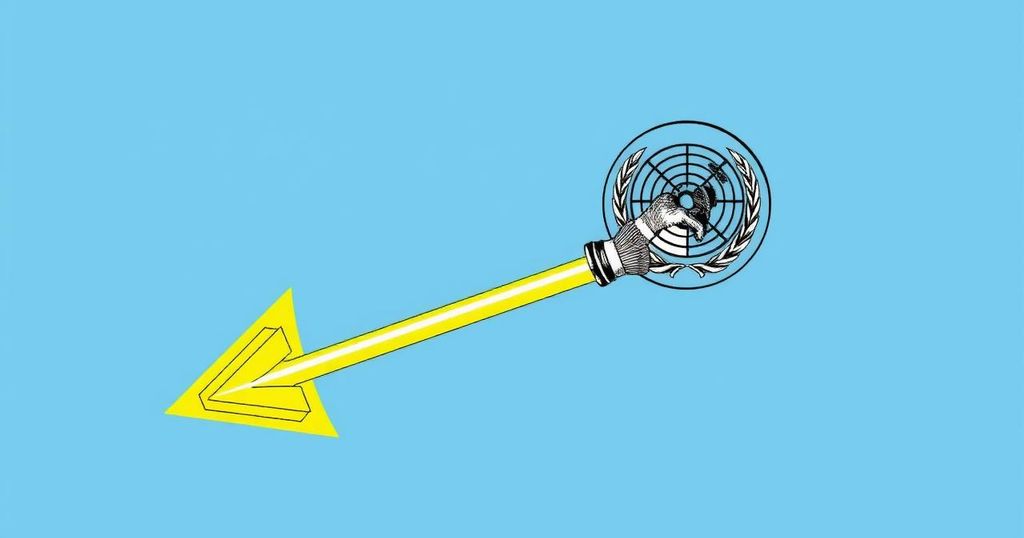Argentina’s diplomatic landscape is changing significantly under President Javier Milei, who insists on ideological alignment with his libertarian views, resulting in the resignation of prominent diplomats, including Ambassador Ricardo Lagorio. The country has notably aligned with U.S. positions at the UN, including opposing resolutions for Palestinian rights and voting against measures to combat violence against women, reflecting a dramatic departure from its previously progressive foreign policy, now influenced by Milei’s disdain for the UN and its ideals.
Last week marked a bittersweet occasion for Ricardo Lagorio, Argentina’s longstanding ambassador to the United Nations, as he bid farewell to his colleagues before retiring from the foreign ministry. His departure coincides with significant shifts in Argentina’s diplomatic landscape, particularly under President Javier Milei, who has requested that diplomats align with his visionary “defense of the ideas of freedom” or resign. This ultimatum led to Lagorio’s resignation, which was swiftly followed by Foreign Minister Diana Mondino. Argentina made headlines with its recent vote in the UN General Assembly, where it supported lifting the long-standing U.S. economic embargo against Cuba. This decision occurred amidst Milei’s libertarian policies that mark a radical pivot from Argentina’s previous left-leaning foreign policy, characterized by a commitment to human rights. Indeed, Milei has dismantled the Ministry of Women, Genders, and Diversity, indicating a clear intent to redefine the country’s stance on various social issues. Milei has openly criticized the UN, claiming it has strayed from its original mission to pursue peace and instead engages in ideological imposition. His remarks included denouncing the UN’s Sustainable Development Goals as a “supranational government program that is socialist in shape.” Such rhetoric aligns with his broader economic agenda aimed at reducing state involvement in favor of a more libertarian approach to governance. Additionally, Milei’s administration is aligning Argentina with the U.S. under President Donald Trump. On the same day Milei attended a gala at Trump’s Mar-a-Lago estate, Argentine representatives abruptly withdrew from the ongoing climate change conference, COP29, expressing Milei’s disdain for the UN’s climate agendas. Argentina’s recent actions at the UN further revealed an unprecedented tilt towards Israeli alignment in voting, evidenced by its opposition to measures aimed at supporting Palestinian statehood. Moreover, Argentina surprised many by voting against a UN resolution aimed at combating violence against women and girls, a stark departure from its previous stance. This vote, among others, signifies an alarming shift in Argentina’s diplomatic priorities under Milei’s leadership. In summary, Argentina under President Milei is undergoing a transformative and controversial realignment of its foreign policy, reflecting his administration’s ideological preferences and economic strategies, potentially retracting years of progressive international efforts.
The evolving landscape of Argentina’s foreign policy is heavily influenced by the recent election of President Javier Milei, whose libertarian ideals sharply contrast with those of his predecessors. Historically, Argentina has championed progressive human rights and gender equality initiatives at the UN. However, Milei’s government appears focused on dismantling these frameworks in favor of an approach that prioritizes a more conservative and U.S.-aligned posture, reflecting changes in political ideology and economic strategy.
In light of President Milei’s administration, Argentina faces a complex and potentially volatile transformation of its foreign policy, moving away from progressive values towards a more conservative alignment. The implications of this shift are significant, as evidenced by recent UN voting patterns and the withdrawal from international commitments, which may redefine Argentina’s role on the global stage amidst rising tensions over traditional and contemporary diplomatic issues.
Original Source: www.passblue.com






